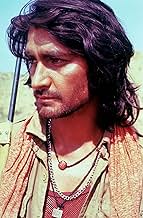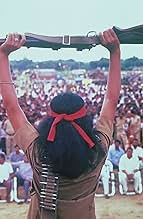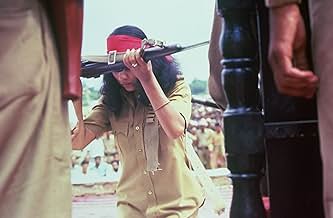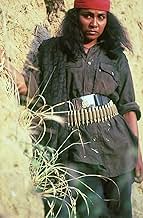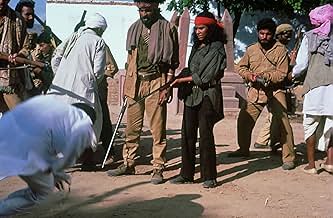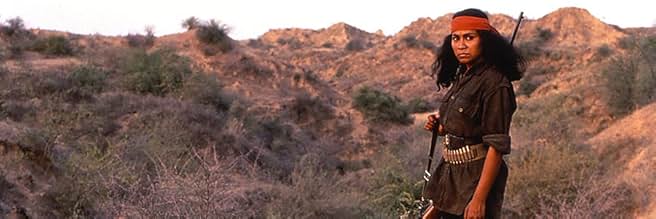PUNTUACIÓN EN IMDb
7,5/10
5,6 mil
TU PUNTUACIÓN
Añade un argumento en tu idiomaThe story of bandit queen Phoolan Devi, who was sent to prison in 1983 and released in 1994.The story of bandit queen Phoolan Devi, who was sent to prison in 1983 and released in 1994.The story of bandit queen Phoolan Devi, who was sent to prison in 1983 and released in 1994.
- Dirección
- Guión
- Reparto principal
- Premios
- 4 premios y 4 nominaciones en total
Nirmal Pandey
- Vikram Mallah
- (as Nirmal Panday)
Raghubir Yadav
- Madho
- (as Raghuvir Yadav)
Manoj Bajpayee
- Man Singh
- (as Manoj Bajpai)
Ranjit Chowdhry
- Shiv Narain
- (as Ranjit Chaudhry)
Reseñas destacadas
Bandit Queen is a difficult film to go through. In the famous world of Bollywood's song and dance, this biographical feature is certainly a breath of fresh air in terms of storytelling and honest filmmaking. Shakhar Kapur handles the subject with great sensitivity and visible empathy towards the main character of Phoolan Devi, whose life story is impossible to even listen to. What this woman had to endure is beyond imagination and is harrowing to watch, but her survival is an inspiring triumph. Bandit Queen is disturbingly realistic, and I can totally understand those who don't like it, because we do not watch films to see reality, but rather to escape it. The movie is by no means entertaining, the story is bitter and excruciating, but there are many lessons one can learn from watching it and, at the very least, realise how privileged most of us are. The film is excellently acted, with Seema Biswas proving her mettle as an actor of extraordinary talent and compassion. Her portrayal is a world-class act on a level of its own, and she totally immerses herself in this most difficult role and life story. May no person ever have to go through what this woman went through to justify the making of a notable biopic of this sort. Kudos to Kapur for an impressive effort. Watch it if you can, expect zero entertainment and just treat it the way you treat documentaries. You might be impressed, if not rewarded.
"Bandit Queen" is the true story of the legendary Phoolan Devi, who was something like Robin Hood of India. While the authorities persecuted her, the media made her famous. In order to avoid the death penalty in the case of capture, in 1983, she surrendered to the authorities, but after eleven years in prison she ran for parliament. She was assassinated in 2001.
The film has a problem with the scenario, some parts are false and in some places it seems hastily and piled up. In all other respects it is greatly made, but quite heavy and difficult.
8/10
The film has a problem with the scenario, some parts are false and in some places it seems hastily and piled up. In all other respects it is greatly made, but quite heavy and difficult.
8/10
I think that the movie was really good. Subject, acting and Nusrat Fateh ALi Khan's music were marvellous. Although the director has succeeded in showing the status of women in rural areas and how they suffer at the hands of male-dominated culture, he has neglected Phoolan's character a bit and has focussed more on the violence faced by her.
I saw Bandit Queen in 2005, over a decade after it was made amidst widespread controversy in India. The language, the stark treatment and the natural acting (by a relatively unknown cast for that time) might have been even more shocking at that time for an Indian populace more familiar with fantasy cinema. The film, the cast, and Shekhar Kapoor, deserve accolades for the breakthrough effort.
The plot is not very different from a typical revenge drama made in various forms in India. In fact, there have been several fictional accounts of this particular story itself. The reason why this stands out is that it's supposed to be a first person account of someone who actually went through all this, and a lot else that doesn't find place on the screen, and survived to tell the tale. Survived long enough to see her story made into a movie at least. Phoolan Devi didn't live very long after being released from prison in 1994.
The film scores on several counts. The cinematography is brilliant. The music is apt. The cast, many of whom became more familiar names later, is very good. But the screenplay is patchy. Things move too fast and in jerks at times. It's understandable though, because there are just too many strands that need to be tied together to make it all cohesive. Or maybe I felt that because I have read Mala Sen's book, which is a more detailed and better, though obviously not as shocking as the visual, account of Phoolan Devi's travails, and which is purported to be one of the main sources for the film.
There are some factual ambiguities too. According to Phoolan Devi, she wasn't present when the Behmai massacre took place, and despite claiming to be the dictated account of Phoolan herself, she is shown to participate, and in fact initiate, the massacre. Then the final scene where Phoolan surrenders shows her touching the feet of the Chief Minister, while in reality she had surrendered to a portrait of Mahatma Gandhi. Symbolic value only, but shows that Phoolan didn't want to show servitude to a living, ordinary person. It would have been nice to show the Chief Minister to have some resemblance to Arjun Singh, who many remember was the CM of Madhya Pradesh then.
But these are small chinks in this eminently well-made movie, a rare gem to come out from the mainstream Indian film industry, made by a man who before this was known best for the ultimate masala movie of the late 80s - Mr India.
The plot is not very different from a typical revenge drama made in various forms in India. In fact, there have been several fictional accounts of this particular story itself. The reason why this stands out is that it's supposed to be a first person account of someone who actually went through all this, and a lot else that doesn't find place on the screen, and survived to tell the tale. Survived long enough to see her story made into a movie at least. Phoolan Devi didn't live very long after being released from prison in 1994.
The film scores on several counts. The cinematography is brilliant. The music is apt. The cast, many of whom became more familiar names later, is very good. But the screenplay is patchy. Things move too fast and in jerks at times. It's understandable though, because there are just too many strands that need to be tied together to make it all cohesive. Or maybe I felt that because I have read Mala Sen's book, which is a more detailed and better, though obviously not as shocking as the visual, account of Phoolan Devi's travails, and which is purported to be one of the main sources for the film.
There are some factual ambiguities too. According to Phoolan Devi, she wasn't present when the Behmai massacre took place, and despite claiming to be the dictated account of Phoolan herself, she is shown to participate, and in fact initiate, the massacre. Then the final scene where Phoolan surrenders shows her touching the feet of the Chief Minister, while in reality she had surrendered to a portrait of Mahatma Gandhi. Symbolic value only, but shows that Phoolan didn't want to show servitude to a living, ordinary person. It would have been nice to show the Chief Minister to have some resemblance to Arjun Singh, who many remember was the CM of Madhya Pradesh then.
But these are small chinks in this eminently well-made movie, a rare gem to come out from the mainstream Indian film industry, made by a man who before this was known best for the ultimate masala movie of the late 80s - Mr India.
Phoolan Devi (played by Seema Biswas) is sold into marriage at 11 and is repeatedly abused from then onwards because she is a woman. She is partially liberated by Vikram Mallah (Nirmal Pandey), one of the bandits she is taken in by and eventually rises to lead the group, extracting vicious revenge on upper-cast men in repayment for what they had done to her.
The film is a fascinating account of the life of Phoolan Devi who was assassinated in September 2001. The film follows from rise (if you can call it that) from abused child to Bandit Queen. Scenes of abuse are tactfully portrayed with the focus on Phoolan's face rather than the act itself. This focus allows the viewer to see the pain that is inflicted by the abuse. This is still very hard to sit and watch be it the abuse by her husband at 11 or the gang rape of adulthood. It's sad that worldwide women are treated as second-class citizens, often subject to this type of terrible abuse as a matter of daily life - even sadder that many religions are interpreted to allow it.
Where the film is weak is the depiction of the two sets of violence - violence against Phoolan is shown as horrible and unforgivable as it should be, however her acts of retaliation are filmed with a more artistic camera and you get the feeling that we are meant to take it that these acts of violence are less horrible because they are revenge attacks. Many of those killed by Phoolan's gang had not done anything to her and were "innocent". The film should have a more even tone across all these actions.
The performances are roundly excellent. All characters no matter how repugnant or noble are played as totally believable - for many you see both sides of their characters. Seema Biswas is excellent as Phoolan Devi, she convinces throughout the film. The subject matter must have been very difficult to act through but she is without a flaw in the lead - the only problem being the slightly sympathetic edge towards her acts of revenge that the film gives.
The film is horrible viewing and yet inspiring that one woman could survive through such events in such a society. Phoolan lived with things that the vast majority of us will ever imagine, she rose up against amazing odds to marry above her caste and be elected to the Indian Parliament. Worth watching to help you be aware of the rest of the world and to ensure that you keep yourself kind towards others in all situations.
Long live Phoolan Devi. May she find more peace in death than she did in life.
The film is a fascinating account of the life of Phoolan Devi who was assassinated in September 2001. The film follows from rise (if you can call it that) from abused child to Bandit Queen. Scenes of abuse are tactfully portrayed with the focus on Phoolan's face rather than the act itself. This focus allows the viewer to see the pain that is inflicted by the abuse. This is still very hard to sit and watch be it the abuse by her husband at 11 or the gang rape of adulthood. It's sad that worldwide women are treated as second-class citizens, often subject to this type of terrible abuse as a matter of daily life - even sadder that many religions are interpreted to allow it.
Where the film is weak is the depiction of the two sets of violence - violence against Phoolan is shown as horrible and unforgivable as it should be, however her acts of retaliation are filmed with a more artistic camera and you get the feeling that we are meant to take it that these acts of violence are less horrible because they are revenge attacks. Many of those killed by Phoolan's gang had not done anything to her and were "innocent". The film should have a more even tone across all these actions.
The performances are roundly excellent. All characters no matter how repugnant or noble are played as totally believable - for many you see both sides of their characters. Seema Biswas is excellent as Phoolan Devi, she convinces throughout the film. The subject matter must have been very difficult to act through but she is without a flaw in the lead - the only problem being the slightly sympathetic edge towards her acts of revenge that the film gives.
The film is horrible viewing and yet inspiring that one woman could survive through such events in such a society. Phoolan lived with things that the vast majority of us will ever imagine, she rose up against amazing odds to marry above her caste and be elected to the Indian Parliament. Worth watching to help you be aware of the rest of the world and to ensure that you keep yourself kind towards others in all situations.
Long live Phoolan Devi. May she find more peace in death than she did in life.
¿Sabías que...?
- CuriosidadesThis was banned by the Indian authorities due to its graphic scenes of sex and violence. It also incurred the wrath of its own subject, Phoolan Devi, who objected to the fact that she hadn't been invited to see the film. Devi claimed it was riddled with inaccuracies.
- Citas
Puttilal: [Tied to a pole and beaten with rifle-butt] Forgive me.
Phoolan Devi: Forgive you?
Phoolan Devi: Write this to the police.
Vikram Mallah: What?
Phoolan Devi: Any man that marries a little girl... I'll kill him.
- Versiones alternativasThe film became banned due to its content. It was later re-released theatrically and the CBFC cut out about 2 minutes of profanity and shortened all rape scenes for an 'A' (adults) rating in 1995. 17 minutes was cut for a U/A rating for television.
Selecciones populares
Inicia sesión para calificar y añadir a tu lista para recibir recomendaciones personalizadas
- How long is Bandit Queen?Con tecnología de Alexa
Detalles
Taquilla
- Recaudación en Estados Unidos y Canadá
- 399.748 US$
- Fin de semana de estreno en EE. UU. y Canadá
- 34.728 US$
- 2 jul 1995
- Recaudación en todo el mundo
- 399.748 US$
Contribuir a esta página
Sugerir un cambio o añadir el contenido que falta

Principal laguna de datos
What is the Spanish language plot outline for La reina de los bandidos (1994)?
Responde
